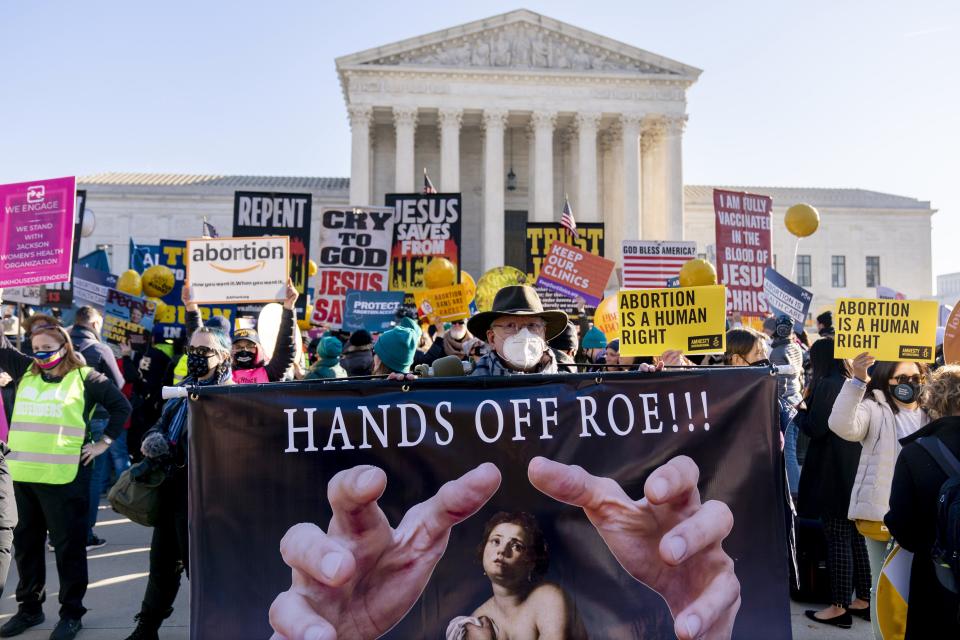Federal appeals court sends Texas abortion law challenge to the Texas Supreme Court
The 5th U.S. Circuit Court of Appeals on Monday asked the Texas Supreme Court to resolve a central question in an ongoing legal challenge to the state's six-week ban on abortion, a highly unusual move that is expected to further delay a resolution in the case.
In a 2-1 vote, a three-judge panel of the 5th Circuit sided with attorneys for the state and agreed to ask the Texas Supreme Court whether the medical licensing officials named in the lawsuit can be sued by the abortion providers behind the challenge.
Abortion providers from across Texas originally sued several state officials in an effort to block enforcement of Senate Bill 8, which took effect Sept. 1, but a divided U.S. Supreme Court said in December all but one of those challenges should be dismissed. Justices said a more narrow case, targeting the licensing officials, could proceed in Texas courtrooms.
Providers had hoped the case would be sent back to a federal district court in Austin with a history of siding with abortion rights advocates, but it was instead sent to the 5th Circuit, considered one of the country's most conservative appellate courts.
Texas abortion law: The potential detour for the lawsuit challenging the Texas abortion law and what it means

In a split decision, the 5th Circuit decided to hear oral arguments on the issue earlier this month, before deciding whether to certify the case to the Texas Supreme Court or remand it to the district court in Austin.
Kimberlyn Schwartz, spokeswoman for the anti-abortion organization Texas Right to Life, celebrated the panel's decision to send the case to the state Supreme Court.
"This is great news for Texas because such action is more likely to ensure a just and favorable ruling, compared to that which could be expected from a pro-abortion federal district judge, to whom the abortion industry asked to send the case," she said in an email.
Should the Texas Supreme Court agree to take up the case and answer the question posed by attorneys for the state, the resulting legal detour could take weeks, legal experts said.
"This decision now keeps the case in limbo — and abortion after 6 weeks in the nation’s second-largest state — a dead-letter, indefinitely," Steve Vladeck, a University of Texas School of Law professor, said in a tweet.
The Texas law bans abortion after about six weeks of pregnancy, before most people are aware they are pregnant. The law employs a unique enforcement mechanism that lets any private individual sue abortion providers or people who aid and abet an abortion past six weeks gestation. Successful litigants can collect at least $10,000.
Nancy Northup, president and chief executive officer of the Center for Reproductive Rights, said the decision by the 5th Circuit "delayed a reckoning" on SB 8's legality.
"As a result, Texans will continue to have to travel hundreds of miles to access abortion care, and those without means to do so will be forced to continue their pregnancies. There is now no end in sight for this injustice that has been allowed to go on for almost five months." Northup said.
More: How the Supreme Court's ruling on a Mississippi abortion law will affect Texas
Opponents of the law argue that it denies people in Texas their constitutional right to an abortion, one upheld by two landmark U.S. Supreme Court decisions. But the unique enforcement tool employed in the law has complicated efforts to find a legal avenue for challenging SB 8.
Attorneys for Texas argue that the state and state officials cannot be sued as a means of blocking enforcement of the law because the state is not responsible for enforcing it — that responsibility lies with private individuals.
But the constitutional right to an abortion may not be on the books much longer, depending on how the U.S. Supreme Court handles a challenge to a Mississippi law that bans abortion after 15 weeks of pregnancy.
Texas is one of several conservative states that has adopted a so-called trigger ban, which would criminalize abortion to the extent permitted by the Supreme Court. The law would take effect 30 days after a relevant ruling from the court and would not require the involvement of the Legislature or any other official to be implemented.
Similar to SB 8, the law would not include exceptions in cases of rape or incest and would only permit abortion under rare circumstances, including when a woman’s life is in danger. The law would not rely on private lawsuits for enforcement. Instead, providers who perform illegal abortions could face up to 99 years in prison and fines of up to $100,000.
More: Sarah Weddington, attorney who secured abortion rights in Roe v. Wade, dies at 76 in Austin
This article originally appeared on Austin American-Statesman: 5th Circuit Court sends Texas abortion law case to Texas Supreme Court

